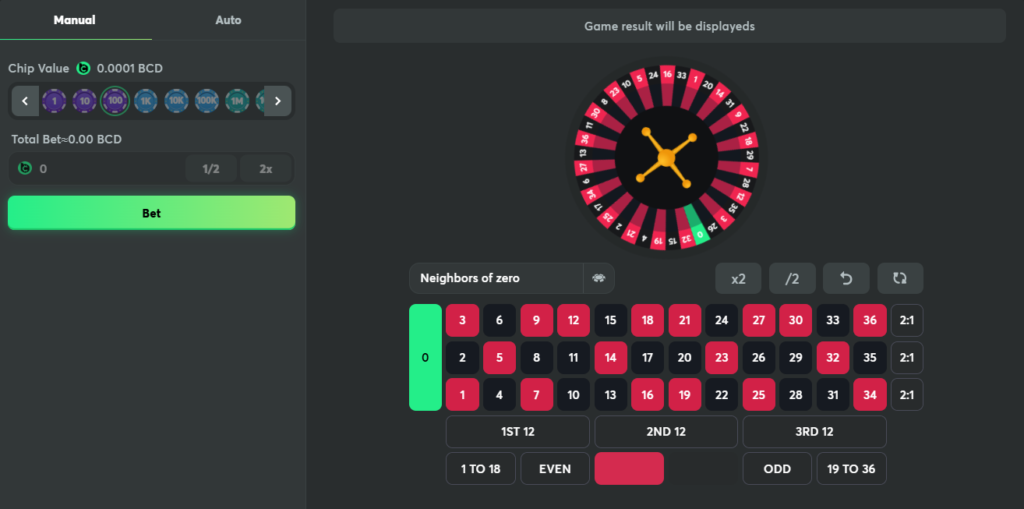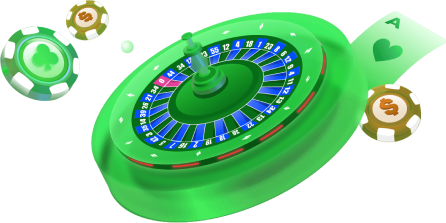What is Roulette?
Roulette is a game of chance where players place bets on numbers, colors (red or black), even or odd values, and groups of numbers. The game is played on a special wheel divided into slots numbered from 1 to 36, plus one or two green slots (0 or 0 and 00 in the American version). The dealer spins the wheel and releases a ball, which lands in one of the slots. If the ball lands on the number or color a player has bet on, the player wins.
Main Types of Roulette
- European Roulette has a wheel with 37 slots, including one “0.” This version is popular in Europe and is considered more favorable to players due to the single green zero.
- American Roulette includes both “0” and “00,” which increases the casino’s advantage.
- French Roulette is similar to the European version but offers additional rules, such as “La Partage” and “En Prison,” which help reduce players’ losses.

Main Types of Bets in Roulette
In roulette, there are two main types of bets: inside and outside bets.
- Inside bets are bets placed on a single number, two adjacent numbers, four numbers in a square, or three numbers in a line. These bets offer high payouts but come with lower odds of winning.
- Outside bets offer more even chances, such as betting on red or black, even or odd, low or high numbers, as well as dozens. These bets have smaller payouts but improve the chances of winning.
Roulette Strategies
Roulette is a game of chance, but there are strategies that help manage bankrolls and increase the odds of winning.
- The Martingale Strategy involves doubling the bet after each loss, allowing players to recover all previous losses when they win. It works well with 1:1 bets, like red/black or even/odd. It’s important to remember that this strategy requires a large bankroll.
- The Fibonacci Strategy uses a number sequence in which each new bet is the sum of the previous two. It is less risky as bets increase more slowly, which allows for smoother bankroll management.
- The D’Alembert Strategy suggests increasing the bet by 1 unit after a loss and decreasing it by 1 unit after a win. This method is suitable for even-odds bets and allows players to gradually compensate for losses.
- The James Bond Strategy involves a fixed bet of $200 per round, distributed as follows: most of the bet goes on high numbers, a smaller portion on middle numbers, and a small amount on “0” as insurance. This strategy is suitable for more aggressive playstyles and requires a larger starting bankroll.
Tips for Successful Roulette Play
Playing European roulette reduces the house edge, as it has only one green “0.” Setting limits helps control spending, and taking breaks between bets protects against the risk of quick losses. It is better to avoid straight bets on a single number as they have lower chances of winning. Don’t try to chase losses if the game is not going in your favor; it is better to take a break than to increase bets.
Common Mistakes in Roulette
- One of the most common mistakes is attempting to predict the outcome based on previous results. Each roulette spin is an independent event, and past results do not influence future ones.
- Betting on every spin can quickly deplete your bankroll, so it’s better to take breaks and think over your bets.
- Relying solely on strategies is also not recommended, as roulette is primarily a game of luck.

Advantages of Playing Roulette
- Roulette offers simplicity of rules and ease of learning.
- It provides a wide range of bets, suitable for different types of players.
- It allows for using strategies to manage bankrolls and adds excitement with the possibility of big wins.
Roulette is an exciting game that can bring a lot of thrills and big wins. It doesn’t require complex skills, but it offers a wide range of strategies to help manage bets. Remember, roulette is primarily a game of chance. Following a strategy, managing your bankroll, and practicing discipline will help you enjoy the game and minimize risks.




